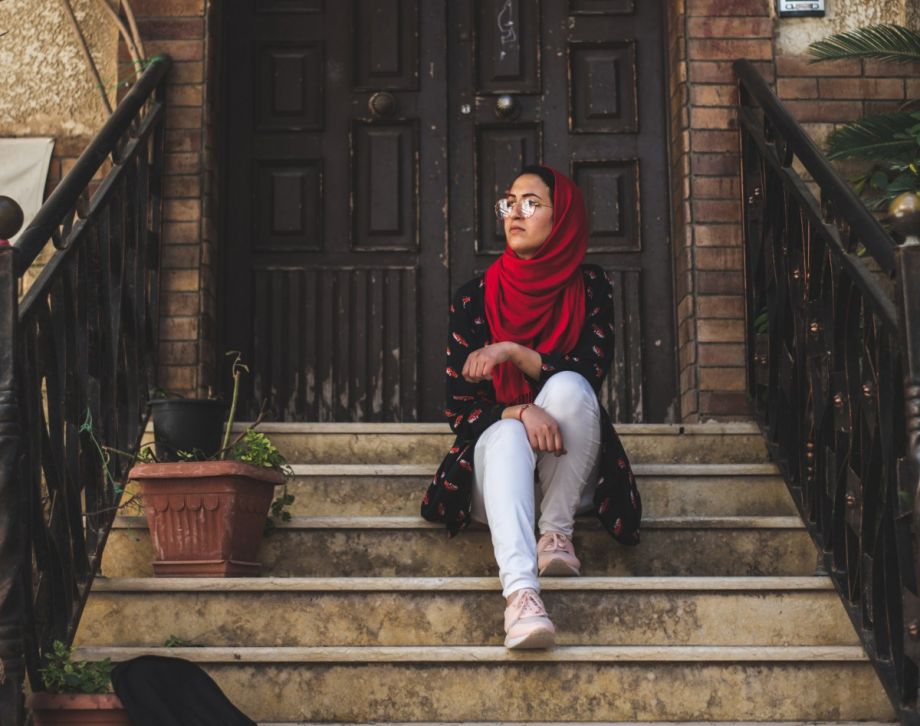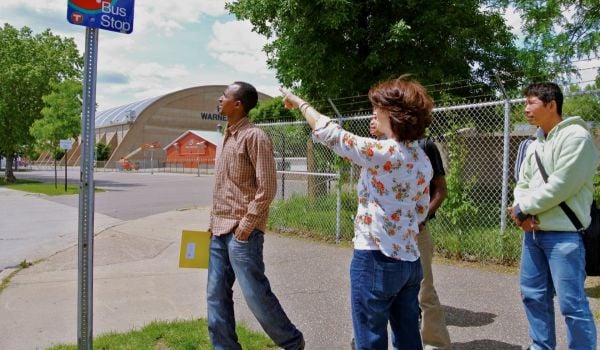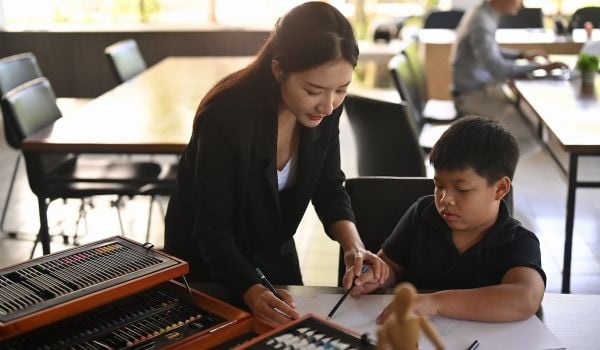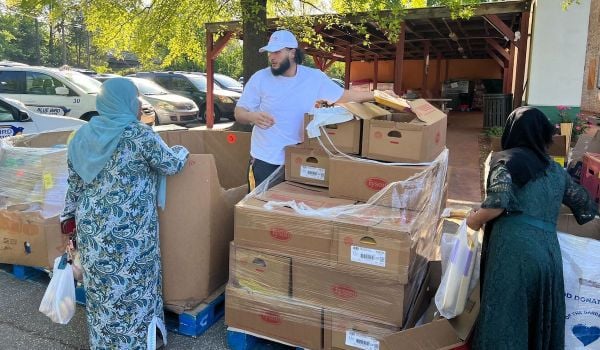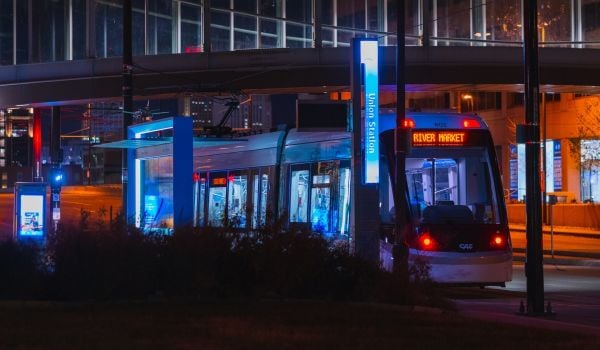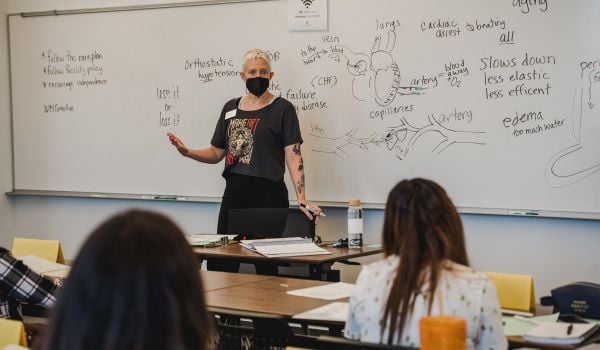When Sofia Khan walks into a room full of Syrian Muslim refugees, she utters “Assalamualaikum” and notices the anxious pairs of eyes that instantly take in her hijab. After months or sometimes years spent navigating the refugee resettlement process and ending up in a foreign country, meeting someone familiar with their culture and customs is a welcome reprieve for refugees. But more often than not, they are greeted by someone who looks nothing like them and doesn’t speak their language or understand what they’ve been through. Around the country, community-based organizations with people of color at the helm are working to change that.
“Having a person in your volunteer group that is the same background as the refugee community helps them feel comfortable,” explained Khan, the founder of KC for Refugees, a Kansas City-based interfaith organization dedicated to coordinating support for refugees. “Going in there with a person of color or a person that speaks their language fluently is really important.”
KC for Refugees serves as a model of community sponsorship, a form of resettlement support that can supplement the more centralized work of U.S. resettlement agencies. In the majority of cases, upon arrival in the U.S. refugees are greeted by a representative of one of the nine domestic resettlement agencies, which receive funding from the Reception and Placement Program administered the State Department’s Bureau of Population, Refugees, and Migrations (PRM) to help cover expenses for refugees’ first three months in the country. Refugees are then connected with the local resettlement office, which arranges their housing, basic furniture, appliances, clothing, and food. Each of the nine agencies has a nationwide network of local affiliates or sub-offices that provide resettlement assistance and services to refugees at the local level. Currently, there are approximately 200 resettlement partners operating across the country.
In contrast, “in community sponsorship, refugees are paired with groups (e.g. faith communities, groups of individuals, businesses, civil society organizations, clubs) who provide clearly defined financial and/or in-kind contributions and volunteer services to support their welcome and integration over a set period of time,” explained Jessica Chapman, director of community engagement at the Ethiopian Community Development Council, Inc. (ECDC), one of the nine national resettlement agencies.
Also referred to as co-sponsorship, this form of community sponsorship facilitates greater local community involvement in resettlement. KC for Refugees, for example, has been greeting refugees with flowers and gifts, setting up their new homes before they arrive and following up after they’ve been through the resettlement process to help with signing up for food stamps, jobs, and other necessities. There are also organizations like the Rohingya Cultural Center in Chicago, led by Executive Director Nasir Zakaria, a refugee from Myanmar. RCC isn’t involved in resettlement yet, but instead helps support refugees navigating life in the U.S. after assistance from the State Department runs out.
Although nearly 75% of refugees coming to the U.S. in 2010 were people of color, eight out of nine of the resettlement agencies are white-led, and ECDC is the only resettlement agency that works primarily with local organizations created or led by former refugees or immigrants. Given the makeup of refugee populations, advocates argue that community-based organizations led by people of color, like Rohingya Cultural Center and KC for Refugees, need to be involved more deeply with resettlement and sponsorship.
“Refugees are placed in different communities across the United States and each community is different in terms of its capacity, engagement, and overall openness and welcome to newcomers,” Chapman said. “There is a growing number, but still relatively few former refugees and immigrants in senior leadership positions across refugee resettlement agencies and affiliate organizations. Their lived experiences and insights are critical for successful resettlement and long-term integration related programming and approaches.”
Critically, community sponsorship can increase opportunities for refugees to connect with people who share their lived experience and culture. Now, with the U.S.’s resettlement program in a rebuilding phase after the Trump administration’s historically low refugee caps, a recent executive order from President Joe Biden might make more room for refugee- and immigrant-led community groups to expand their support of refugees. The executive order stated that “to meet the challenges of restoring and expanding United States Refugee Admissions Program (USRAP), the United States must innovate, including by effectively employing technology and capitalizing on community and private sponsorship of refugees, while continuing to partner with resettlement agencies for reception and placement.”
Private sponsorship is another form of community sponsorship where individuals, communities, interest groups, companies, and other entities lead and fund refugee resettlement efforts separate from the Reception and Placement Program. For example, private sponsorship might potentially allow refugees who are already lawfully in the U.S. to sponsor their family members without waiting in limbo for years and sometimes decades to be reunited.
“Community sponsorship and private sponsorship are important ideas that could help improve and expand the US Refugee Admissions Program,” said Devon Cone, senior advocate for women and girls at Refugee International. “If the U.S. adopted some of these models as Biden suggested in his executive order … I think it would be a win-win.”
Earlier this month, a coalition of advocacy groups comprised of the International Refugee Assistance Project (IRAP), Amnesty International USA (AIUSA), and the Niskanen Center offered formal recommendations in a report to the Departments of State and Health and Human Services as they design an expanded community sponsorship system that includes a new private sponsorship program for refugees, slated to be rolled out early next year.
Although private sponsorship has been wildly successful in recent years in Canada, Australia, and Europe, the recommendations note that it hasn’t existed in the United States since the 1980s when President Ronald Reagan launched the Private Sector Initiative, which allocated 10,000 spaces for privately-supported refugees each year and facilitated 16,000 refugees’ admission. In 2016, Assistant Secretary of State Anne Richard announced a new private refugee sponsorship pilot program, but plans were derailed when the Trump administration came into office a few months later.
“Advocates are hopeful that the U.S. will rebuild a bigger, bolder system than exists anywhere in the world,” said Denise Bell, researcher for refugee and migrant rights at AIUSA and one of the architects of the report.
The recommendations argue that any private sponsorship program re-started in the U.S. should increase the number of refugees resettled here, serving as an addition to those resettled using government funds—not a replacement for government-supported resettlement.
The report encourages the White House to co-design a sponsorship model with a spectrum of stakeholders, including refugees themselves. It recommends including a strong monitoring and evaluation component and program iterations that center refugees as key stakeholders in their own resettlement process and integration plan. They also drive home the significance of equity, inclusion, and diversity as guiding principles.
“The impact of community has to be at the center of it,” Bell said.
While both private and community sponsorship programs can be a way to increase capacity and safeguard resettlement from administrative changes, they are challenging to manage and often present power imbalances. There are also questions around the “white savior complex.”
“This is a threat that runs through the social welfare world,” said Elizabeth Foyde, IRAP’s private sponsorship program director. “We have to address that at all levels of the resettlement structure. A big part is the training and the resources.”
According to Chapman, leadership and management staff at refugee resettlement organizations and agencies need to proactively develop strategies and policies to engage POC in their community outreach and community sponsorship efforts. That includes placing former refugees and immigrants in leadership and senior management positions.
In addition, advocacy groups such as Amnesty International are creating training resources such as an allyship guide for sponsors to reference as the White House rebuilds the resettlement structure. It delves into cultural bias, language implications, and managing racial micro behaviors. Chapman is also leading the development of a training toolkit, called the “Wider Welcome,” for ECDC’s network and others in the resettlement field, focused on engaging communities of color in their community sponsorship programs.
“This toolkit is designed to help resettlement staff understand issues of race and racism among the communities they work, both among the refugee communities they serve and the communities of color they hope to engage in their refugee resettlement efforts,” Chapman said. “In order to successfully help refugees integrate into their new communities, recruited Community Sponsorship volunteers, regardless of their ethnic background, need to be able to talk about race and racism, and understand similarities and differences between different communities’ experiences, in order to support the refugee family or individual they are paired with.”
This story originally appeared in Prism and appears here as part of the SoJo Exchange from the Solutions Journalism Network, a nonprofit organization dedicated to rigorous reporting about responses to social problems.
Jennifer Chowdhury is a journalist and writer dedicated to human rights reporting with a special focus on women of color around the world whose voices are stifled by patriarchy, systematic racism, and socioeconomic burdens. She spent two years reporting on the Rohingya refugee crisis in Bangladesh and a lifetime of witnessing immigrant communities in New York City. Her work has been featured in The Washington Post, NPR, The Guardian, The New York Times, Elle magazine, and more.

